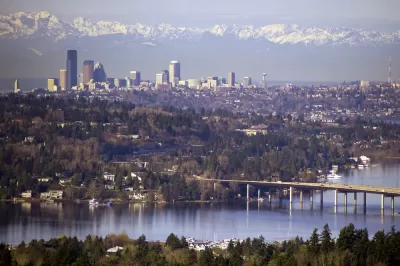Drawing on a slew of examples, Dan Bertolet argues that Washington's State Environmental Policy Act (SEPA) has been co-opted in ways that run against its original purpose: protecting the environment.

When the state of Washington enacted SEPA in 1971, writes Dan Bertolet, "heightened awareness of ecology spawned stricter controls on development. In the subsequent decades, though, we've learned that concentrating new homes in existing urbanized areas is an ecological imperative."
Bertolet's main gripe is with how SEPA appeals are used to stymie construction in urban areas. "Outside of urban housing construction, SEPA is an essential set of environmental regulations. [...] It's in the city where SEPA has gone off the rails."
Under current law, Bertolet writes, "Anyone averse to a proposed apartment building for whatever reason can file a legal appeal through SEPA that delays construction. The risk of appeal introduces toxic uncertainty to homebuilding, because delay, as I've spelled out elsewhere, can rack up costs that bleed projects into the red. The result is fewer new homes." The article includes a wide range of such examples.
"SEPA fixates on what's immediate and localized while ignoring what's long-term and far-reaching. For example, SEPA demands to know how many cars will come and go from a new apartment building, but it is oblivious to how increased housing density reduces car use across a metro region." Bertolet's ultimate conclusion is that SEPA's focus needs to be redefined on the state level.
FULL STORY: Washington’s State Environmental Policy Act Has Become A Bane To Sustainable Urban Development

Alabama: Trump Terminates Settlements for Black Communities Harmed By Raw Sewage
Trump deemed the landmark civil rights agreement “illegal DEI and environmental justice policy.”

Study: Maui’s Plan to Convert Vacation Rentals to Long-Term Housing Could Cause Nearly $1 Billion Economic Loss
The plan would reduce visitor accommodation by 25% resulting in 1,900 jobs lost.

Planetizen Federal Action Tracker
A weekly monitor of how Trump’s orders and actions are impacting planners and planning in America.

Wind Energy on the Rise Despite Federal Policy Reversal
The Trump administration is revoking federal support for renewable energy, but demand for new projects continues unabated.

Passengers Flock to Caltrain After Electrification
The new electric trains are running faster and more reliably, leading to strong ridership growth on the Bay Area rail system.

Texas Churches Rally Behind ‘Yes in God’s Back Yard’ Legislation
Religious leaders want the state to reduce zoning regulations to streamline leasing church-owned land to housing developers.
Urban Design for Planners 1: Software Tools
This six-course series explores essential urban design concepts using open source software and equips planners with the tools they need to participate fully in the urban design process.
Planning for Universal Design
Learn the tools for implementing Universal Design in planning regulations.
Caltrans
Smith Gee Studio
Institute for Housing and Urban Development Studies (IHS)
City of Grandview
Harvard GSD Executive Education
Toledo-Lucas County Plan Commissions
Salt Lake City
NYU Wagner Graduate School of Public Service





























